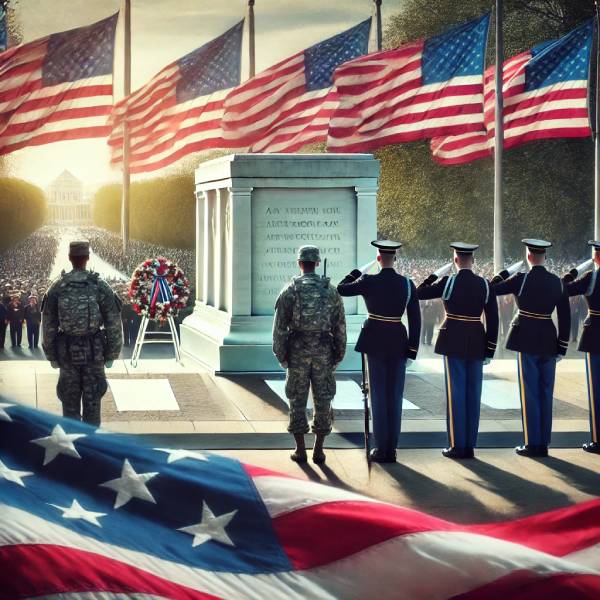

Veterans Day, observed on November 11th each year, is a federal holiday in the United States dedicated to honoring military veterans—those who have served in the U.S. Armed Forces. While many countries celebrate a version of Veterans Day, the U.S. holiday has a unique history tied to the end of World War I and the broader recognition of military service. This article explores how Veterans Day became a federal holiday, its significance, and interesting facts about this important day of remembrance.
Veterans Day has its roots in the end of World War I, which was often referred to as "the war to end all wars." The armistice that ended the fighting between the Allied nations and Germany went into effect on the 11th hour of the 11th day of the 11th month—November 11, 1918. The cessation of hostilities on this day marked a significant turning point in world history and was a cause for celebration in many Allied nations.
In 1919, on the first anniversary of the armistice, President Woodrow Wilson proclaimed November 11th as "Armistice Day," a day to honor the sacrifices of those who served in World War I and to reflect on the broader goal of peace. Armistice Day was initially observed with parades, public gatherings, and a moment of silence at 11:00 a.m. to commemorate the exact time when the armistice took effect.
While Armistice Day was originally intended to honor those who served in World War I, the outbreak of World War II in 1939 and the subsequent participation of millions of Americans in the armed forces led to a broader recognition of military service. After World War II ended in 1945, and with the addition of veterans from the Korean War, there was growing sentiment that Armistice Day should honor all veterans, not just those who served in the First World War.
In 1954, after lobbying efforts by veteran organizations, Congress passed a bill to change the name of Armistice Day to "Veterans Day." President Dwight D. Eisenhower signed the legislation into law on June 1, 1954, officially establishing Veterans Day as a national holiday to honor all American veterans, regardless of which conflict they had served in. This change recognized the contributions of veterans from multiple wars and cemented November 11th as a day of national gratitude and remembrance.
Veterans Day is unique among U.S. federal holidays because it specifically honors military veterans. While Memorial Day—celebrated in May—focuses on remembering those who died in military service, Veterans Day honors all who have served in the U.S. Armed Forces, whether in times of war or peace. This distinction makes Veterans Day an important occasion for acknowledging the dedication and sacrifices made by veterans from all branches of the military.
Many communities across the U.S. hold Veterans Day parades, ceremonies, and public events to show appreciation for veterans. Schools, local governments, and veterans’ organizations often organize events that include speeches, flag-raising ceremonies, and tributes to military service members. Veterans Day also serves as an opportunity for the nation to reflect on the importance of supporting veterans after their service, including addressing their needs for healthcare, education, and employment.
Although Veterans Day is specifically an American holiday, many countries around the world observe similar holidays on or around November 11th to commemorate the end of World War I. In Canada, November 11th is observed as "Remembrance Day," and in the United Kingdom, it is known as "Armistice Day." Both holidays are marked by moments of silence, poppy-wearing, and events that honor military service members who fought in wars.
While the U.S. emphasizes veterans’ contributions, Remembrance Day and Armistice Day in other countries are primarily focused on honoring those who died in combat. The global observance of these holidays highlights the shared impact of World War I and the continued importance of recognizing military service worldwide.
In 1968, Congress passed the Uniform Monday Holiday Act, which moved several federal holidays to specific Mondays to create more three-day weekends for American workers. Under this act, Veterans Day was temporarily moved from November 11th to the fourth Monday in October, starting in 1971.
However, the change was met with widespread opposition from veterans’ organizations and the public, who felt that the historical significance of November 11th was too important to ignore. Many believed that moving Veterans Day diluted its connection to the end of World War I and undermined the solemnity of the holiday.
Due to the public backlash, in 1975, President Gerald Ford signed legislation to return Veterans Day to its original date of November 11th, starting in 1978. This restoration ensured that Veterans Day would always be observed on the date that marked the end of World War I, preserving its historical context while continuing to honor all U.S. veterans.
As a federal holiday, Veterans Day affects various aspects of business and legal operations:
To avoid disruptions, it’s important to plan ahead when dealing with deadlines and transactions around Veterans Day. Tools like DeadlineCalculator.com can help individuals and businesses manage deadlines during federal holidays like Veterans Day.
Veterans Day, celebrated on November 11th, is a day of national gratitude, honoring the service and sacrifices of military veterans from all branches of the U.S. Armed Forces. From its origins as Armistice Day, commemorating the end of World War I, to its expansion into Veterans Day after World War II, the holiday serves as a reminder of the importance of military service in protecting the freedoms enjoyed by all Americans. As the nation continues to reflect on the needs of veterans, Veterans Day remains a vital opportunity to express appreciation and support for those who have served.
Note: This article provides historical insights into Veterans Day as a federal holiday. For more information on how federal holidays impact deadlines, visit DeadlineCalculator.com.